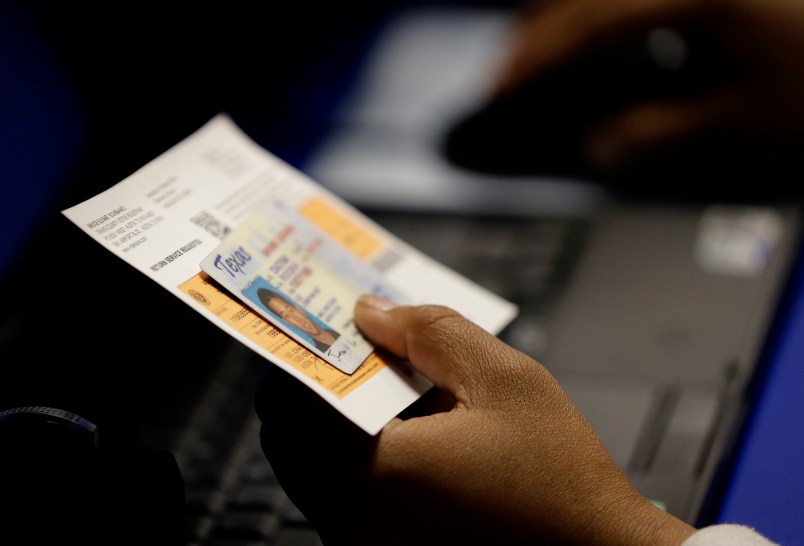A years-long and heated legal fight over Texas’ voter ID law — believed to be among the harshest in the nation when it was passed in 2011– has culminated with the state agreeing to weaken the law ahead of November’s election.
In a court filing Wednesday the state and its opponents in the high-profile lawsuit, including the Department of Justice, outlined the terms they had agreed to for softening the law for the November election. Last month, a majority of the justices on the full 5th U.S. Circuit Court of Appeals struck down the Texas law, and ordered a remedy to be hashed out at the district court level. Wednesday’s agreement will now go to U.S. District Judge Nelva Gonzales Ramos for her approval.
The agreement says that in addition to the forms of ID permitted by the voter ID law, registered Texas voters will also be able to show a valid voter registration certificate, a certified birth certificate, a current utility bill, a bank statement, a government check, a paycheck, or any other government document that displays the voter’s name and address, as long as they sign a declaration saying that they had a reasonable impediment to attaining the types of ID allowed by the 2011 law.
The agreement also says election officials are prohibited from questioning voters about their reasonable impediment claims, while requiring that the state implement a training and educational program for the new procedures.
In a statement to TPM, the Texas Attorney General’s office continued to defend the voter ID law and suggested the state was still considering an appeal to the Supreme Court:
“The U.S. Supreme Court said that Voter ID is a legitimate means of preventing voter fraud, and Texans widely support it to defend the integrity of our elections. This case is not over,” said Marc Rylander, a spokesman for Texas Attorney General Ken Paxton. “In light of the Fifth Circuit’s recent decision, we are working hard on saving all the important aspects of our voter id law. Given the time constraints of the November elections and the direction of the Fifth Circuit, today’s filings pertain to a proposed interim remedy while we continue evaluating all options moving forward, including an appeal of the Fifth Circuit’s decision to the U.S. Supreme Court.”
Read the full joint motion below:







Sucks to be Texas…
Look out for the brown wave about to sweep the state.
Is there some way to liquefy this article and inject it directly into my vein?
A gun may also be shown.
I am a Democratic elections judge in Texas. The judge needs to nix the affidavit. That validates the whole ID requirement. Then once she is satisfied with the agreement, she needs to then make the state advertise far and wide that no ID is actually required. Just knowing they needed to have a particular ID kept some folks away from the polls all together, especially students. I am OK with proof of residency which does have bearing on voting for down ballot races, but if a person’s name is not the same as the name on say, the utility bill, we still would have a problem in our more rabidly red precincts.
Yep, because you can be sure that the Republican poll-watchers are going to be trained to create all kinds of shenanigans.